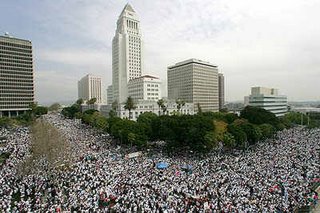Calls for speedier regional economic integration between U.S., Mexico
Via WorldNetDaily:
WASHINGTON – The controversial "Secure Borders, Economic Opportunity and Immigration Reform Act of 2007," which would grant millions of illegal aliens the right to stay in the U.S. under certain conditions, contains provisions for the acceleration of the Security and Prosperity Partnership, a plan for North American economic and defense integration, WND has learned.
The bill, as worked out by Senate and White House negotiators, cites the SPP agreement signed by President Bush and his counterparts in Mexico and Canada March 23, 2005 – an agreement that has been criticized as a blueprint for building a European Union-style merger of the three countries of North America.
"It is the sense of Congress that the United States and Mexico should accelerate the implementation of the Partnership for Prosperity to help generate economic growth and improve the standard of living in Mexico, which will lead to reduced migration," the draft legislation states on page 211 on the version time-stamped May 18, 2007 11:58 p.m.
Since agreement on the major provisions of the bill was announced late last week, a firestorm of opposition has ignited across the country. Senators and representatives are reporting heavy volumes of phone calls and emails expressing outrage with the legislation they believe represents the largest "amnesty" program ever contemplated by the federal government.
President Bush yesterday attempted to tackle the concerns of those opposing the bill – denying again he would ever support an "amnesty" bill. The Senate is expected to begin debating the measure this week.
In its current form, the bill would offer probationary legal status to the estimated 15 million to 20 million illegal aliens who were in the U.S. before Jan. 1, 2007. Those who then met a series of requirements — including payment of a $5,000 fine and $2,000 in processing fees — could gain citizenship within an estimated 12 to 13 years.
In his weekly radio address, Bush said the plan "will help us resolve the status of millions of illegal immigrants who are here already, without animosity and without amnesty."
Bush said under the bill, those who "come out of the shadows" of illegal immigration will qualify for a special visa if they "pass a strict background check, pay a fine, hold a job, maintain a clean criminal record and eventually learn English."
To become citizens, he said, they must pay an additional fine, "go to the back of the line [of applications], pass a citizenship test, and return to their country to apply for their green card."
Among other provisions, including increased hiring of Border Patrol officers, the bill would establish a temporary worker program.
Rep. Steve King, R-Iowa, called the deal "amnesty – a pardon and reward for lawbreakers." "Many senators claim that their deal renews respect for the rule of law," King said. "Let me respond to that absurd statement by stating clearly, you cannot simultaneously tear down and rebuild one of our constitutional principles. I took an oath to uphold the Constitution and the rule of law. The price for amnesty is the sacrifice of the rule of law." King, ranking Republican on the Immigration Subcommittee of the U.S. House Judiciary Committee, said each of the senators who struck the deal "should wear a scarlet letter 'A' for amnesty." Sen. Jim DeMint, R-S.C., also was quick to label the bill "amnesty." The senator said it "rewards people who broke the law with permanent legal status and puts them ahead of millions of law-abiding immigrants waiting to come to America." "I don't care how you try to spin it, this is amnesty," DeMint said. "I hope we don't take a thousand page bill written in secret and try to ram it through the Senate in a few days," he added. "This is a very important issue for America and we need time to debate it." In fact, while the draft bill is far from finished, it is 326 pages in its current form. The House is not expected to act until the Senate passes a bill. Sen. Ted Kennedy, D-Mass., called the deal "the best possible chance we will have in years to secure our borders and bring millions of people out of the shadows and into the sunshine of America." Illegal immigrants would be allowed to come forward and obtain a "Z visa" that puts them on a track for permanent residency within eight to 13 years. Fees and a fine of $5,000 are required and heads of household first must return to their home countries. The illegals would be able to obtain a probationary card right away to live and work in the U.S.


















